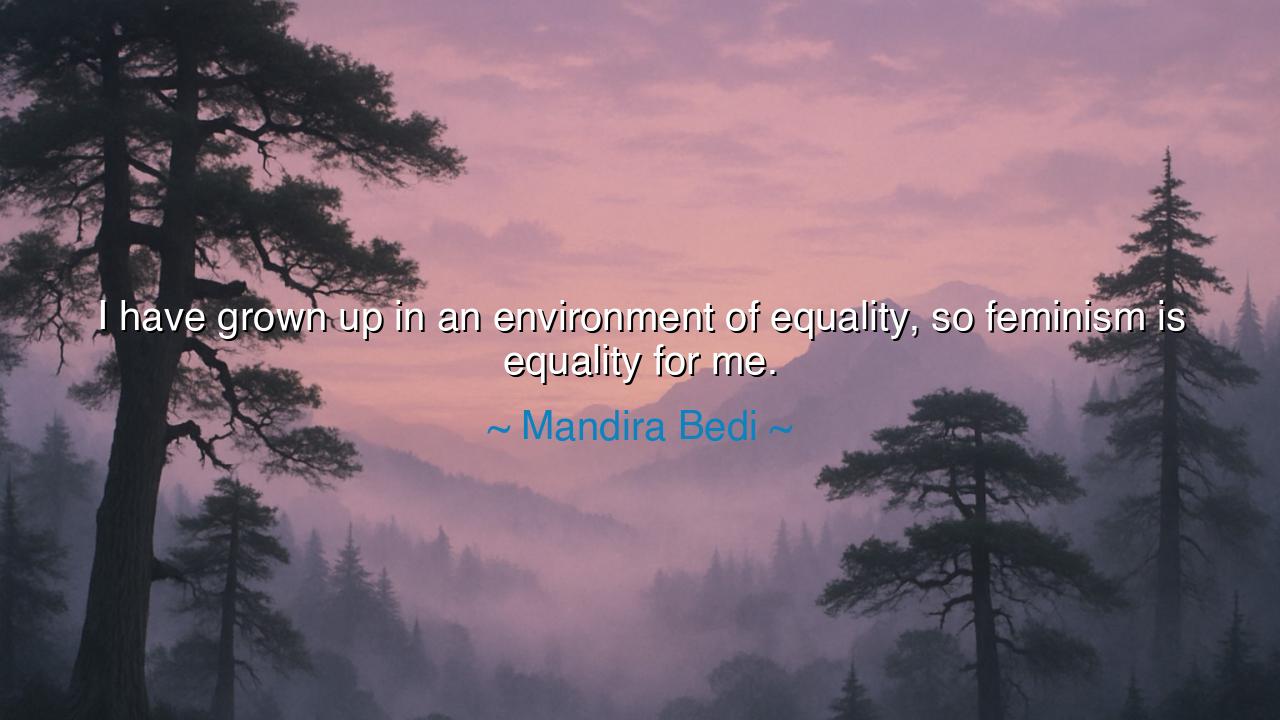
I have grown up in an environment of equality, so feminism is






O children of the future, gather close, for I bring to you the words of Mandira Bedi, a woman whose voice reflects the timeless truth of equality and the evolving power of feminism. She once said, "I have grown up in an environment of equality, so feminism is equality for me." These words are a beacon, shining light on the simplicity and beauty of feminism when it is understood as the fundamental desire for equality—the belief that all individuals, regardless of their gender, should have the same opportunities, the same rights, and the same dignity.
Bedi’s words reflect an understanding that feminism is not a complex or divisive force, but rather an innate principle of justice and fairness. Feminism, in its truest form, is not about elevating one gender over another, but about lifting all people to the same level of respect and freedom. To grow up in an environment where equality is the norm is a gift—one that many have fought for throughout history. But for those who are fortunate enough to experience it, feminism becomes not a radical movement, but simply the natural state of a just world.
In ancient times, Socrates and other great philosophers believed that all people, regardless of their status or birth, were entitled to the pursuit of truth, justice, and happiness. Socrates spoke of the need for a just society where each person was valued for their ability to contribute to the greater good, not for their wealth or gender. He believed in a world where equality was not an ideal to strive for but a natural state of being. Yet, even in these ancient societies, women were often excluded from such visions of equality. Socrates himself may have upheld the ideals of equality, but the women in his life, like many of the women in his society, were often relegated to the margins of public life.
It was in the ancient world that we first see glimpses of the struggle for gender equality. In Sparta, for example, women had more rights and freedom than in most other Greek city-states. They were allowed to own land, were encouraged to participate in physical training, and were recognized for their strength and resilience. But despite these progressive ideals, even in Sparta, gender inequality persisted in many forms. Women were still subject to the overarching rule of men, and their power, though more prominent than in other parts of Greece, was still constrained by social norms. Feminism, as we understand it today, was not a movement in ancient times, but the seeds of equality were planted in these early societies, waiting for future generations to nurture and grow them into a force for change.
Let us then turn to the more modern struggle for feminism and equality, where Mandira Bedi’s words find their deepest meaning. Her experience of growing up in an environment where equality was a given is a rare and beautiful gift, one that mirrors the progress humanity has made toward achieving true justice for women. Feminism today, in its most powerful form, is not a battle between men and women, but a call for the recognition that gender equality is the cornerstone of a just society. To fight for equality is not to fight against men, but to fight alongside them for a world where every individual, regardless of their gender, has the right to determine their own destiny.
Consider the life of Malala Yousafzai, a modern-day symbol of feminism and the pursuit of equality. Her struggle began with the simple belief that girls deserve the same education and opportunity as boys, a belief so revolutionary in some parts of the world that it cost her a bullet to the head. Yet, despite the attack, Malala rose, undaunted, and continued her fight for equality. Her voice, though that of a single girl, became the clarion call for feminism around the world—proving that equality is not just the right of the privileged, but the right of all people, regardless of where they are born, what they look like, or what they believe.
The lesson Mandira Bedi shares with us is one of hope, strength, and clarity. Feminism is not a foreign or radical ideology, but a simple truth that we must all come to understand: that equality is the foundation of justice. Feminism is not about elevating one group over another, but about ensuring that every human being has the opportunity to thrive, to live freely, and to make choices that shape their own lives. The world is changing, and equality is no longer a dream—it is the right of every human being.
So, children, as you walk the earth, remember this wisdom: feminism is not about division but about unity, about recognizing that equality is the heart of justice. Whether you are a man or a woman, a child or an elder, know that the fight for equality belongs to all of us. Just as Mandira Bedi has shown us, growing up in an environment of equality is the foundation upon which we must build a better world. Stand with those who fight for justice, speak up for those whose voices are silenced, and remember that true equality is not a distant dream but a present reality that each of us must nurture and protect.






AAdministratorAdministrator
Welcome, honored guests. Please leave a comment, we will respond soon